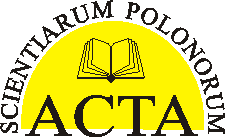Title
HEALTH RISKS AND CONSEQUENCES OF ZOONOTIC AGENTS IN FOOD
Autor
Jan Uradziński, Beata Wysok
Keywords
foodborne diseases, Salmonella spp., Campylobacter spp., Staphylococcus spp., Escherichia coli O157
Abstract
Foodborne diseases are caused by consuming contaminated foods. There are many opportunitis for food to became contaminated as it is produced and distribution. Many foodborne pathogens are present in healthy slaughter animals. Meat can become contaminated during slaughter by contact with small amounts of intestinal contents. Later in food processing microbes can be introduced from infected humans who handled the food. Most of foodborne infections are caused by variety of bacteria, viruses, and parasites. Foodborne diseases have many different symptoms, however bacteria or toxin enters the body through the gastrointestinal tract, and often causes the first symptoms there, so diarrhea, nausea, vomiting, and abdominal pain. The most commonly recognized foodborne infections are those caused by bacteria Salmonella spp., Campylobacter spp., Staphylococcus spp. and E. coli O157.
Pages
15-22
Cite
Uradziński, J., Wysok, B. (2008). HEALTH RISKS AND CONSEQUENCES OF ZOONOTIC AGENTS IN FOOD. Acta Sci. Pol. Med. Vet., 7(2), 15-22.
Full text


